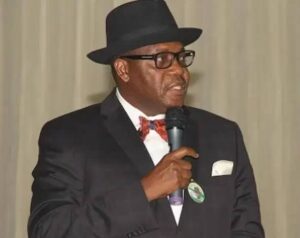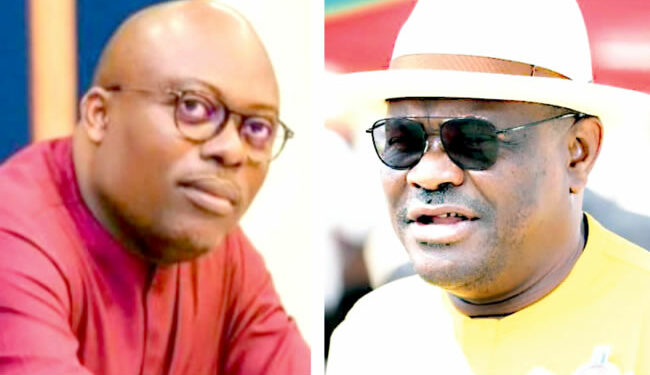Politics in Nigeria is often shaped by the intricate and sometimes volatile relationship between godfathers and their protégés. The ongoing power tussle between Rivers State Governor, Siminalayi Fubara, and his political benefactor, Nyesom Wike, is a textbook example of how these relationships can unravel.
Fubara, born in 1975, is a trained accountant whose meteoric rise in the Rivers State civil service remains one of the most controversial in the state’s history. In his early 40s, he was granted an unprecedented, fast-tracked promotion under the administration of then-Governor Wike. In a span of just two years, Fubara moved from Level 14 to Permanent Secretary on Level 17—a move that angered many of his peers in the civil service. While they murmured in private, they dared not openly challenge Wike’s decision.


A Journey to Power Paved by Wike
Fubara was later appointed as the Accountant of Rivers State Government House, a strategic position that placed him at the heart of state financial transactions. His growing influence was not accidental—it was engineered by Wike, who at the time was grooming him for higher office.
However, in the lead-up to the 2023 Rivers State governorship election, Fubara’s political trajectory faced a significant hurdle. The Economic and Financial Crimes Commission (EFCC) declared him wanted over allegations of large-scale withdrawals running into billions of Naira—funds allegedly moved in cash using vouchers signed by Fubara as Government House Accountant.
Rather than face prosecution, Fubara went underground. He was reportedly kept in ‘safe houses’ in Port Harcourt and Abuja until the elections were over. With Wike’s political machinery behind him, he emerged victorious and was subsequently sworn in as Governor of Rivers State—his new position conferring on him constitutional immunity from prosecution.

The Fallout: When the Godfather Turns Against the Godson
With Fubara in office, many expected him to govern under Wike’s shadow, in the traditional style of Nigerian godfatherism. However, cracks soon appeared in their relationship. The former governor, now a minister in President Tinubu’s administration, expected absolute loyalty from his protégé. Fubara, on the other hand, sought to assert his independence.
This growing rift led to a political crisis, with attempts to impeach Fubara and counter-moves by the governor to consolidate power. The situation escalated into open confrontation, with lawmakers, commissioners, and political allies taking sides. What had once been a smooth godfather-godson relationship turned into an all-out battle for control of Rivers State.

Lessons from History: Learning from Abdulfatah Ahmed
Fubara’s struggle mirrors similar political battles in Nigeria’s past. A striking comparison can be drawn with the relationship between former Kwara State Governor, Abdulfatah Ahmed, and his predecessor, Bukola Saraki.
Ahmed, a former banker with a background at Société Generale Bank and GTBank, was handpicked by Saraki, who had himself served two terms as Kwara Governor before moving to the Senate. Unlike Fubara, Ahmed carefully managed his relationship with Saraki, maintaining a delicate balance that allowed him to complete his tenure without open rebellion or political crises.
Had Fubara adopted a similar approach, perhaps the turbulence in Rivers State could have been avoided. But in politics, every dynamic is different, and not all godfathers are willing to play the long game.


A Crisis of Mutual Guilt
Ultimately, both Wike and Fubara are products of the same political system. Wike, who elevated Fubara beyond his peers and shielded him from prosecution, is now on the receiving end of the kind of political betrayal he himself has orchestrated in the past. Fubara, on his part, enjoyed the privileges of being a favored godson but now finds himself struggling under the weight of his benefactor’s expectations.
This saga is a stark reminder that in Nigerian politics, godfatherism is a double-edged sword. Beneficiaries often embrace it when it suits them but rebel when the demands become suffocating. If you do not want to be ‘stained,’ do not accept to be a godson.
The lesson here is simple: when you dine with a political godfather, always use a long spoon.
Prof. Oluwatobi Oke
The National Patriots.




